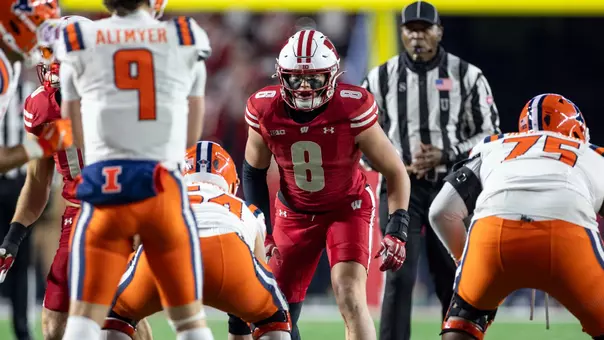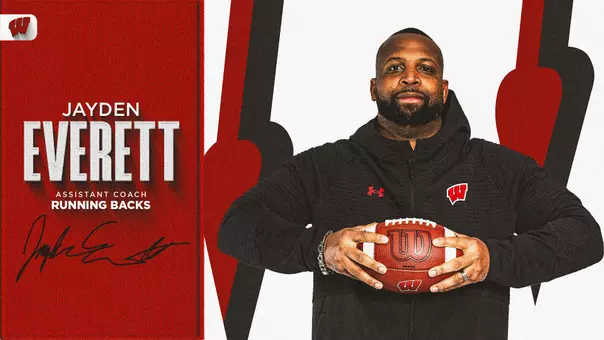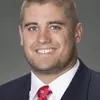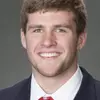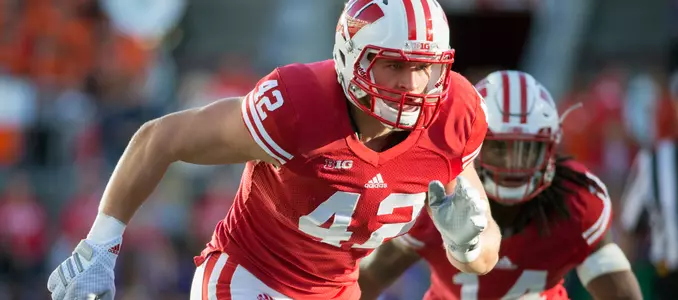
Watt has waited long enough for chance to shine
August 15, 2016 | Football, Mike Lucas
Injuries in his past, T.J. Watt making an impression on Wisconsin’s defense
 |
||
|
BY MIKE LUCAS
UWBadgers.com Senior Writer
MADISON, Wis. — It can be a conundrum for football coaches and players alike. How much do you tackle in practice? And how does a tackler get ready to tackle in a game without live tackling?
"In practice, it's a lot of footwork," said Wisconsin outside linebacker T.J. Watt. "Right now, we're getting the feet in the right spot so we're in position to make the tackles."
Plenty of thought is given to the tackling fundamentals and practice structure with the intent of avoiding unnecessary collisions and keeping players off the ground and out of the training room.
"You try to set up drills that simulate a game situation as much as possible," said UW assistant Tim Tibesar, citing an emphasis on individual components of tackling and different tackling situations.
"You drill the heck out of it and keep doing it … that's the best you can do, and when you do get the handful of live opportunities in practice, you've got to make the most of it."
Tibesar has a wide range of coaching experience, including stints in the National Football League with the Chicago Bears and the Canadian Football League with the Montreal Alouettes.
"One of the things that we do here that has been different from any place I've ever been," he said, "is that when we come out of stretch we do a tackle circuit, and it's not just with the defense.
"It's with all of the offensive guys who will be involved in special teams, so they get an opportunity to tackle. It just shows the players how important it is."
There are a variety of ways to hone techniques. One of the stations on the circuit may be reserved for a brightly colored tackling ring or donut made of foam and vinyl.
Usually they're about 60 inches high, roll easily without tipping and present a moving target. The ring promotes heads-up tackling and accents leg drive, upper body leverage and hand placement.
"We're simulating a back running out (in space)," Watt said of the drill. "And you're trying to dive for his legs. Wrap and roll."
The ring was introduced to the team last season. Tibesar gives it a thumbs-up.
"It's really hard to simulate a low tackle in practice without someone possibly putting themselves in a position to get injured," Tibesar said. "So the donuts have been a great addition."
There are other drills involving tackling dummies and the one-man sled, Watt's favorite.
"As a linebacker, you're going to have a lot of one-on-one matchups," Watt said. "Take a shuffle step, go right at it, bring it up and dump it on the ground — simulating again like it was a running back."
Watt doesn't have a problem with the amount of simulation that takes place in lieu of live tackling. "Not if it keeps guys safe," he said. "I'm all for it."
Beyond the safety issues, he noted, "All the tackling circuit stuff is muscle memory. So once it comes to the season, it's all second nature and you won't have to think about making a tackle at all."
While Ivy League schools have eliminated tackling from practices, most head coaches, including Wisconsin's Paul Chryst, believes that some full-contact hitting is necessary for development.
Watt is definitely on board. "At the end of the day," he said, "it's still football — Wisconsin football — and we're going to be physical and we're going to tackle in practice."
It's just very limited and controlled — restricted mostly to scrimmages.
"We'll talk as a staff, based on everyone's health at every position, on how much we'll be able to do live," said Tibesar. "Every team is a little different.
"The more veteran your defense, all you're trying to do is knock the rust off. If you've got a bunch of new guys who haven't done it live in a game you probably do a little more live tackling."
Added Watt, "Coach (Chryst) doesn't want to do it a lot — to keep guys healthy."
After dealing with injuries his first two seasons, Watt has never felt healthier. Or better about his chances to finally be a steady contributor to the defense as the starting boundary linebacker.
"I feel great," said the 6-foot-5, 243-pound Watt. "I feel like I got stronger, faster and bigger (over the summer). And I'm just ready. I feel more confident. The game is slowing down for me more."
Watt used the offseason to "jell with a lot of the guys on and off the field." But he made a point of working just as hard, maybe harder, when he left campus and returned home for the weekends.
"I had a great summer — I just felt like the workouts went really well," said Watt, a redshirt junior from Pewaukee. "There was a lot of individual work on the weekends.
"I'd work on my footwork, my drops and just keeping my pads low in the run game. Because I'm a taller guy at outside linebacker, I have to keep my pads low against shorter fullbacks."
Besides reconnecting with his mom and dad, Connie and John, a retired firefighter — what he described as "getting back to the roots with my family" — there were also trips to the Lodge.
"I would go home to the Lodge — my brother's cabin," said Watt, one of the Lodge brothers, along with J.J. Watt of the Houston Texans and Derek Watt of the San Diego Chargers.
Located in Waukesha County, J.J. Watt's four-bedroom, three-kitchen log cabin (4,500 square feet) sits on about 35 acres of land.
"I'd work out with J.J. and Derek if they were home or I'd do it by myself," T.J. Watt said. "It was all about getting down to football and wanting to get better."
Nobody epitomizes that credo better than J.J. Watt, the preeminent defensive player in the NFL. Meanwhile, Derek Watt is revisiting his own roots — as Melvin Gordon's blocking back with the Chargers.
"We talk every day, me and my brothers, a lot of people don't know that about us," said T.J. Watt. "We have a big group chat. I send a lot of film to my brothers, too."
Who wouldn't want to be critiqued by J.J. Watt?
"Sometimes, it just for fun," he said. "Other times, it's like, 'What do you think I could have done here differently?' He'll tell me, mostly on the pass rush, because that's his specialty."
T.J. Watt admitted that he watches a "ton" of film in general. As the boundary 'backer, his model is Vince Biegel, who has shifted to the field 'backer previously manned by Joe Schobert.
"I watch film of myself, I watch film of Vince," he said. "I'll watch from the last training camp to see where I was, then watch it from the spring and then watch practices (this past week).
"I'll also watch Vince from the spring and Vince from games. I watched the LSU game from two years ago and a lot of film on LSU from last year."
In the 2014 season opener, Wisconsin squandered a 24-7 second half lead in a 28-24 loss to the Tigers. Schobert and Biegel were the starting outside linebackers for the Badgers in Houston.
"It's relatively the same defense," said Watt, acknowledging the offseason transition from former UW defensive coordinator Dave Aranda (who's now at LSU) to Justin Wilcox.
Biegel, who has been named a team captain, is well aware of Watt's study habits.
"T.J. keeps embracing the roles that he has been put into," he said. "He's a guy who's very willing and eager to learn … he's like a sponge."
Tibesar has seen the same things in Watt.
"One week into it, he's had a great camp," he said. "He definitely looks like a Big Ten starter. He's continuing to take steps with his game from where he was at the end of spring to where he is now.
"He's gaining confidence, which is always big part of anybody's play.
"I expect him to be an impact player for us."
Derek Watt's graduation has impacted T.J. Watt. They were UW teammates for three years.
"Derek was a big motivator for me," he said, "because I saw how hard he worked and how hard he wanted to make the team better in any way that he could. He would do anything.
"That really opened my eyes. I want to get on special teams and help this team in any way possible, too. That's why I was playing nose (guard on pass downs last year) just to get on the field."
T.J. Watt had a flashback to his freshman season which was erased by injuries to both knees. Back then, he was struggling to make an impression as a tight end.
"At media day, Derek was always the one sitting in the chair (for interviews)," he recalled. "And I was the one going, 'God, I wish I was the one in the chair getting interviewed.'"
Recently, he got his wish; he got to sit in his own folding chair on the Camp Randall Stadium turf and he got to answer questions about his emergence and not just his brothers' careers.
"I'm going to miss Derek," he said. "But he's on to better things."
So is T. J. Watt, who concluded, "I'm just trying to make them proud."
You can probably guess who makes up "them."



